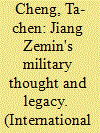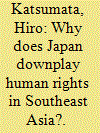|
|
|
Sort Order |
|
|
|
Items / Page
|
|
|
|
|
|
|
| Srl | Item |
| 1 |
ID:
072989


|
|
|
|
|
| Publication |
2006.
|
| Summary/Abstract |
This paper sheds light on aspects of functionalism and neo-functionalism in the Sunshine Policy and evaluates its contribution to inter-Korean relations through statistical analyses. On the whole, the policy could increase the trade volume and diversify trade structures encompassing primary and secondary industries, as well as processing-on-commission-based trade in economic sectors. Our research results demonstrate that the policy has contributed to the progress of inter-Korean relations in socio-economic areas. Notwithstanding the increasing economic gap between the North and South, inter-Korean trade has expanded in the context of the economic urgency of the North and the mutual benefits of inter-Korean cooperation. In social sectors, the Kim Dae Jung government in comparison to previous governments encouraged personal exchanges, and these personal contacts should enhance mutual understanding between the North and South Korean people. In political and military sectors, the Sunshine Policy has been less positive in the current military build-up by both Koreas. Since the security issue of the two Koreas is the most vital factor for survival, broad and long-term perspectives based on mutual reliance and trust are needed.
|
|
|
|
|
|
|
|
|
|
|
|
|
|
|
|
| 2 |
ID:
072992


|
|
|
|
|
| Publication |
2006.
|
| Summary/Abstract |
In its relations with Taiwan and China, Washington has begun to implement separate dual strategies in order to simultaneously deter unilateral action while balancing out the rival political and military forces of each side. A simple standard strategy just is not sufficient to maintain the status quo. The way to maintain peace is for Washington to keep its role as a moderator between the two sides while preventing both from taking unilateral steps toward goals that would naturally provoke the other. US policy has to mirror the duality of the cross-strait arena by implementing dual balancing and deterrent strategies. It is also imperative that policymakers realize the complexity of the situation so as not to unwittingly provoke either side. This paper is an analysis of the emerging US strategy of deterring both sides of the Taiwan Strait from taking unilateral action while maintaining a balance of military and political forces, and gives some suggestions as to the further development of this strategy.
|
|
|
|
|
|
|
|
|
|
|
|
|
|
|
|
| 3 |
ID:
072993


|
|
|
|
|
| Publication |
2006.
|
| Summary/Abstract |
Nearly for 15 years as the Chairman of China's Central Military Commission, Jiang Zemin, albeit lack of real military experience, has gradually developed his military theories and principles in the process of consolidating military authority. Unquestionably, Jiang is not only the core of the third generation leadership in China, but also the most powerful man in China's military until now. That makes researchers interested in exploring military thought of this man controlling the largest armies in the world. In this paper, Jiang's basic military framework, 'Five Sentences', including 'Politically Qualified', 'Militarily Tough', 'Attitudinally Excellent', 'Strictly Disciplined' and 'Materially Guaranteed' will be separately discussed. With interpretations of 'Five Sentences', the author will thereafter provide personal comments and analysis
|
|
|
|
|
|
|
|
|
|
|
|
|
|
|
|
| 4 |
ID:
072996


|
|
|
|
|
| Publication |
2006.
|
| Summary/Abstract |
The end of the cold war brought a new era in international politics that had the potential for creating a more cooperative and peaceful world. At the heart of this ‘new world order’ was to be the United Nations Security Council, which would finally be able to fulfill its obligations under the UN Charter. In the immediate post-cold war years it appeared that this optimism was well founded as the Security Council became increasingly active in authorizing peacekeeping and peace-building missions. Just over a decade later, however, the crisis over Iraq again brought serious concerns regarding the UN's purpose and legitimacy. This article examines the circumstances surrounding the recent UN Security Council dispute in order to illuminate the merits of multilateral cooperation. It also asks, more fundamentally, whether multilateralism can be sustained in a unipolar world.
|
|
|
|
|
|
|
|
|
|
|
|
|
|
|
|
| 5 |
ID:
072991


|
|
|
|
|
| Publication |
2006.
|
| Summary/Abstract |
Since coming to office in 2000, President of the Russian Federation, Vladimir Putin, has taken a pragmatic and calculating approach to the conduct of foreign policy in order to promote Russia's geopolitical and economic interests. For him, a higher profile on Korean issues has been an opportunity to show that Moscow can influence Pyongyang and play a meaningful role in great power diplomacy on the Korean peninsula. As a result of active diplomacy toward North Korea, the two former communist allies put a period to the deteriorating relations in the 1990s; after the September 11 terrorists attack and the launch of the war on terrorism Moscow's influence over Pyongyang reached its peak. The beginning of the North Korean nuclear crisis in October 2002, however, relegated Moscow to a marginalized position in the Korean issue. This paper examines how Putin's pragmatic diplomacy was put into effect in Russia's foreign policy toward North Korea and how circumstances on the Korean peninsula have affected Russia-DPRK bilateral relations. An analysis of these factors shows why Russia's role in the ongoing Six-Party process has become insignificant. At the present time, it is certainly plausible that Russia will not activate diplomatic efforts to solve the North Korean nuclear crisis and will be satisfied with merely securing a seat at the multilateral talks in Northeast Asia.
|
|
|
|
|
|
|
|
|
|
|
|
|
|
|
|
| 6 |
ID:
072995


|
|
|
|
|
| Publication |
2006.
|
| Summary/Abstract |
This article aims to uncover the nuances of Singaporean foreign policy's theoretical contributions to a local variant of realism in international relations, as sourced from the thoughts and discourse of the Republic's elite foreign policy-makers. Previously, pinioning Singapore within classical realism has meant that questions of hegemonic socialization of ideas have been ignored in analysing its foreign policy. It behoves the scholar to pose questions to ideological verities of policy doctrines: From where did it originate? What are its tenets? How is it chosen over other alternatives? The conclusion however hopes to reveal that in terms of discourse ‘Singaporean realism’ is less completely faithful to classical realist precepts than is originally believed by pre-existing scholarship. The theorizing of Singaporean foreign policy is likely to be reconciled in terms of an oxymoron such as ‘practical idealism’ and ‘weak state, soft power’.
|
|
|
|
|
|
|
|
|
|
|
|
|
|
|
|
| 7 |
ID:
072990


|
|
|
|
|
| Publication |
2006.
|
| Summary/Abstract |
This paper traces the role that US played in the development of Korean democracy and maintaining peace and security in the Korean peninsula. First, it looks back into the US role in the Korean political transformation from 1950s through 1980s. It examines why the US introduced American style democracy in the divided country and what was the role of the US in the critical junctures of regime changes and transformations. The United States had two contradictory objectives in South Korea: to build up South Korea as 'a showcase for democracy' and as an anti-communist buffer state. The two objectives set 'the American boundary' to South Korean democracy. The first objective acted upon as an enabling condition for incipient democracy, while the second acted upon as a confining condition to development of democracy in South Korea. Second, it investigates the role that the US played in the outbreak of financial crisis in 1987 and in the ensuing comprehensive neoliberal restructuring of the economy by the Kim Dae Jung government after the crisis. Third, it analyzes three events that put US-Korean relations under stress since the inauguration of Bush administration: Anti-Americanism, perception gap on North Korea, and the new military transformation initiative of US. Finally, it draws policy rationales for stronger Korea-US alliance in the future from the Korean perspective: Korea-US alliance as leverages against China and Japan, means of pursuing an effective engagement policy toward North Korea, a cornerstone to lift South Korea to a hub state in Northeast Asia, and geopolitical balancer and stabilizer in Northeast Asia after the unification of Korea.
|
|
|
|
|
|
|
|
|
|
|
|
|
|
|
|
| 8 |
ID:
072994


|
|
|
|
|
| Publication |
2006.
|
| Summary/Abstract |
Japan makes little effort to promote human rights in Southeast Asia, although it sees itself as an advanced industrialized democracy. In comparison with the United States and the European Union (EU), Tokyo's approach is less intrusive and coercive, and more tolerant and accommodative. What can be described as the economic-interest explanation holds that Japan takes a non-intrusive approach in order to maintain favorable relations with the Southeast Asian countries, so as to maximize its interests in the areas of trade and investment, and official development assistance (ODA). The present study finds that this line of argument is insufficient, and thus puts forward an alternative explanation. The identity explanation holds that Japan has been sympathetic to the special concern of the Southeast Asian countries over state sovereignty, and thus takes a non-intrusive approach. This is because while Japan sees itself as an advanced industrialized democracy it also identifies itself as an Asian country.
|
|
|
|
|
|
|
|
|
|
|
|
|
|
|
|
|
|
|
|
|